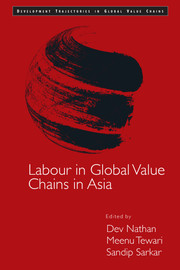Book contents
- Frontmatter
- Contents
- Figures
- Tables
- Foreword
- Preface
- Acknowledgements
- Introduction
- Captive Governance
- Modular Governance
- 11 From Disposable to Empowered: Rearticulating Labour in Sri Lankan Apparel Factories
- 12 Scripted Performances? Local Readings of ‘Global’ Health and Safety Standards in the Apparel Sector in Sri Lanka
- 13 Diffusing Labour Standards Down and Beyond the Value Chain: Lessons from the Mewat Experiment
- 14 Social Upgrading in Mobile Phone GVCs: Firm-level Comparisons of Working Conditions and Labour Rights
- 15 The Politics of Global Production: Apple, Foxconn and China's New Working Class
- 16 New Strategies of Industrial Organization and Labour in the Mobile Telecom Sector in India
- 17 Global Production Networks and Labour Process
- Relational Governance
- Conclusions
- Notes on Contributors
- Index
11 - From Disposable to Empowered: Rearticulating Labour in Sri Lankan Apparel Factories
from Modular Governance
Published online by Cambridge University Press: 23 July 2017
- Frontmatter
- Contents
- Figures
- Tables
- Foreword
- Preface
- Acknowledgements
- Introduction
- Captive Governance
- Modular Governance
- 11 From Disposable to Empowered: Rearticulating Labour in Sri Lankan Apparel Factories
- 12 Scripted Performances? Local Readings of ‘Global’ Health and Safety Standards in the Apparel Sector in Sri Lanka
- 13 Diffusing Labour Standards Down and Beyond the Value Chain: Lessons from the Mewat Experiment
- 14 Social Upgrading in Mobile Phone GVCs: Firm-level Comparisons of Working Conditions and Labour Rights
- 15 The Politics of Global Production: Apple, Foxconn and China's New Working Class
- 16 New Strategies of Industrial Organization and Labour in the Mobile Telecom Sector in India
- 17 Global Production Networks and Labour Process
- Relational Governance
- Conclusions
- Notes on Contributors
- Index
Summary
Introduction
Sitting around a conference room table, three male mid-level managers at Finewear Garments delivered a presentation about their factory, which employs 2900 people in Sri Lanka. The conversation started out as a heavily scripted, technical description of their transition to lean manufacturing, but gradually the managers inserted anecdotes that conveyed their enthusiasm. One manager interrupted the presenter to say:
Actually, Finewear Garments is called Finewear University [within the larger company]! So people come and have a look at the practices and they copy things from us.
Indeed, there was a large banner on the shop floor that said, in large print, ‘FINEWEAR UNIVERSITY: Learning to Achieve Higher Performance’, and underneath it was an oversized training schedule. The managers told me, with great pride, how they had reorganized production in ways that empowered employees to make decisions that they would not have been involved in previously.
The managers spoke with particular passion about their efforts to change the negative perception of garment workers in Sri Lankan society and among global buyers (their ‘customers’). For instance, managers described how they put up banners around town so that their employees would ‘feel powerful when they are walking with their families’, and to ensure that ‘even family members know they have been given due respect for their jobs.’ They expressed frustration with visitors who, upon seeing the headscarves and hearing the title ‘machine operator’, think that Sri Lanka has the same ‘adverse practices as other countries’. ‘This is not the case’, one of the managers exclaimed, ‘Because they are … bringing in 54 per cent of foreign exchange in Sri Lanka, so we need to recognize that!’
Having male garment factory managers decry the undervaluation of women's work was striking, given that it seems to contradict the feminist literature on the systemic devaluation of women's labour in globalized production (Fernandez-Kelly, 1983; Mills, 1999; Ong, 1987; Salzinger, 2003; Wright, 2006). This devaluation, which Wright (2006) calls a ‘myth of disposability’, is deployed through management discourses and practices that reproduce the ‘disposable third world woman’ as a normalized subject and reaffirm systems of power and hierarchy that enable the production of value.
- Type
- Chapter
- Information
- Labour in Global Value Chains in Asia , pp. 239 - 264Publisher: Cambridge University PressPrint publication year: 2016



